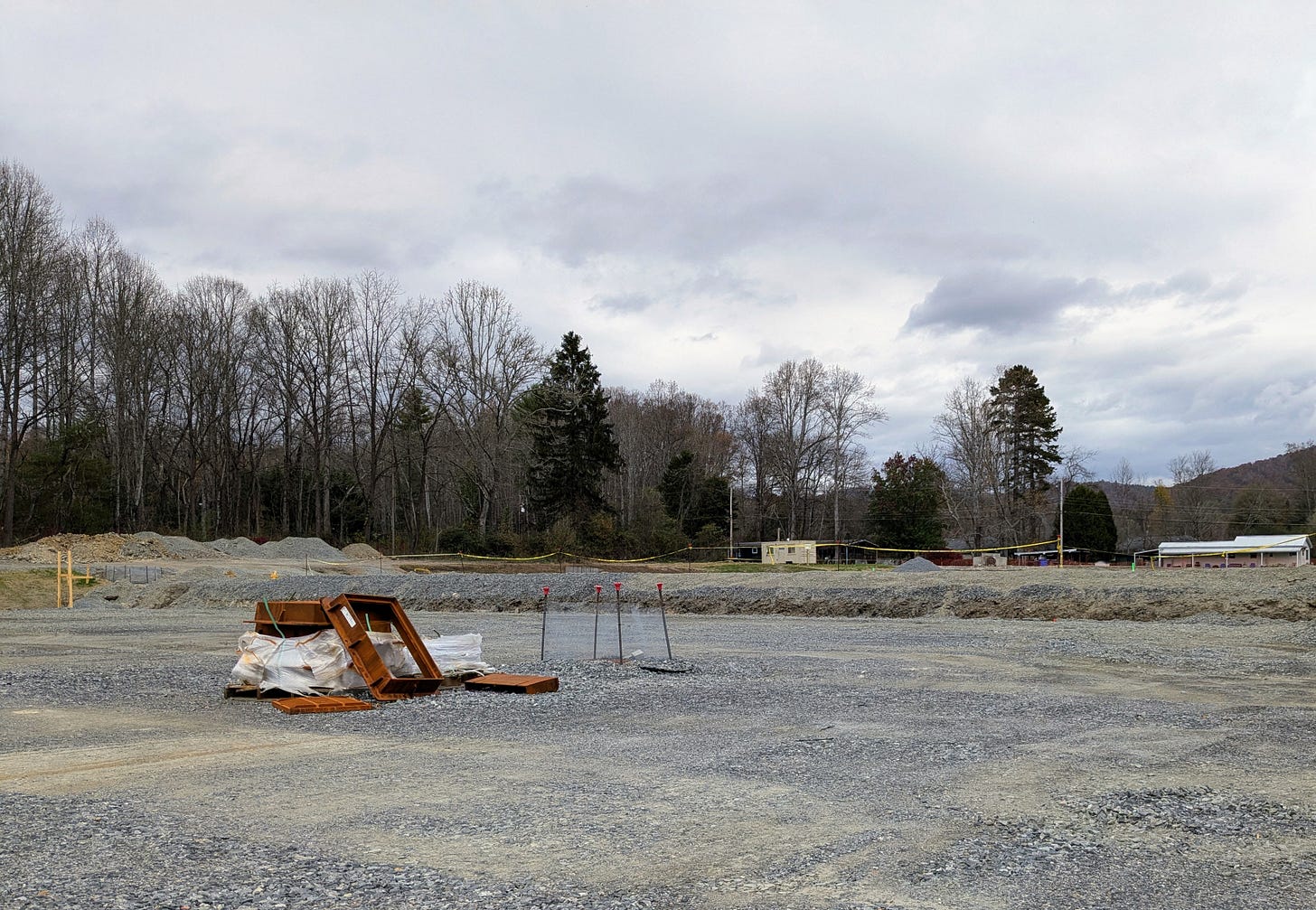Economic Development Progresses in a County with “Limited Product”
Drawing investment is tough in a county with a shortage of land and industrial buildings. But the Transylvania Economic Alliance is working to make the most of available opportunities.
BREVARD — In the world of economic development, vacant commercial buildings and developable parcels of land are “products.”
And in a county dominated by mountains, floodplains and tracts of publicly owned property, finding and marketing these assets is a tough job — tougher still because private industrial construction has been negligible since the end of Transylvania County’s manufacturing heyday more than two decades ago.
“Product is the common denominator. It all starts with land and buildings,” which are “very, very limited,” Burton Hodges, executive director of the Transylvania Economic Alliance, said in an extended interview Tuesday in his downtown Brevard office.
But he also described the following efforts on the part of the county and the Alliance to expand these opportunities and squeeze the most benefit out of the ones available:
An accelerated effort on the part of the Alliance to find and evaluate properties for potential development. “Our due diligence budget this year is going to be pretty high,” Hodges said.
The growth of parcels in this mix due to the extension of water and sewer lines along Rosman Highway west of Brevard and the expansion of high-speed internet access across Transylvania.
The hiring of an Alliance lobbyist to push the state to provide financial backing and/or risk protection for development of the most promising product of all — the long-dormant 525-acre former site of the Ecusta paper mill.
Ongoing work on the $5.3-million, 40,000-square foot expansion of the Alliance’s Sylvan Valley Industrial Center on Ecusta Road.
Finally, there’s the amendment to the county’s economic development tax incentive policy that was approved by the County Commission last month and that focuses on promoting well-paid employment.
“Placing an emphasis on high-wage job creation is an outcome that everybody wants,” Hodges said of the new policy. “That’s a key goal of economic development.”
A Focus on Good Jobs
The need to advance this goal was highlighted by incentive packages awarded in 2023 to two projects, a resort east of downtown Brevard and a now-stalled deluxe RV park planned off Wilson Road. Though both promised big boosts to the county’s tax base, critics said they wouldn’t bring enough jobs — or not enough well-paid ones.
Work to revise the policy began early this year, Hodges said, and not just in response to this criticism. The Alliance’s newly expanded board of directors recognized that the previous tax-incentive metrics — approved shortly after the creation of the nonprofit Alliance a decade ago — were overdue for an update.
The goal was to remain competitive with other counties in the region, Hodges said, and the resulting document was based on an analysis of the incentives they offered.
Both the old and new policies rely on “scorecards,” which award points that help determine the percentage of tax reimbursements that projects receive.
These scores serve as a guide for commissioners who ultimately set the terms of packages offered, and one feature of the new policy reflects an enhanced incentive the Commission offered in 2022 to a project it considered especially valuable, the expansion of Pisgah Labs Inc.
Though the old policy allowed a maximum of five years of rebates for new investment, commissioners extended that to nine years for Pisgah Labs. That time frame is now “codified” in the new policy, Hodges told commissioners last month.
The amount of money developers put on the table remains a crucial factor in accumulating points, but the minimum threshold for investment in the new policy climbed from $250,000 to $500,000 for existing businesses and to $1 million for new enterprises.
A bigger change is in the awards for job creation.
The old policy pledged 20 points for projects that promised five jobs and only 10 more points for ones that offered 26 or more positions. The only wage requirement was that these new jobs pay at least the county’s average annual salary, currently $45,752.
The new policy offers only five points for new or expanded enterprises that meet the minimum threshold for employment creation — five new jobs — and up to 15 points for new or expanded businesses that create more than 26.
The real bonuses kick in for well-paid jobs, ranging from 10 points for the addition of jobs merely meeting the county average and up to 35 points for positions paying at least 150 percent of that amount.
An idea of how this policy will play out can be gathered from a proposal from a company that outfits and services emergency vehicles to establish a regional headquarters in unincorporated Transylvania.
It is code-named “Project Fuego,” and on Monday commissioners backed this initiative’s application for a state grant to help cover the cost of upgrading the building the company is eyeing for its new location.
If the investors commit to Transylvania, they are also on track to also receive a tax incentive based on the old metrics, which were in place when it began negotiations with the Alliance, Hodges said.
But its promise of a total investment of $550,000 and the creation of 10 jobs paying an average of about $57,000 per year might not even qualify it for incentives under the terms of the new scorecard.
Brevard City Council member Aaron Baker had been one of the most vocal proponents of updating the policy. As the city’s representative on the Alliance board, he was also a member of the subcommittee that helped develop the new guidelines.
“Ten years on, it became obvious that we weren't exactly incentivizing the jobs and the projects that we really wanted to target,” he said of the previous policy.
About the new scorecard, he said, “I think it’s definitely an improvement.”
Ecusta

What about a remaining item on the Alliance’s to-do list, receiving state support for marketing the Ecusta property?
State Rep. Mike Clampitt, whose district includes Transylvania, cautioned that lawmakers are currently focused on recovery from the impacts of Hurricane Helene.
But he said that during next year’s legislative session, when lawmakers are set to create a biennial budget, “all options remain on the table” for the Ecusta parcel.
He didn’t elaborate on those options and neither did Hodges, or at least not much.
But he did say he hopes to secure state funding to help with the development of the property and/or a commitment to protect prospective buyers and taxpayers from the risk that comes with developing such contaminated sites.
PGIM, the real estate investment arm of Prudential Financial Inc., is the owner of the property and between 2008 and 2011 completed a massive cleanup of mercury and other toxins in partnership with another company that has since pulled out of involvement with the site.
This work resulted in “brownfield agreements” with the state Department of Environmental Quality that offered protection for the future development of several tracts on the site, last used for manufacturing in 2003.
But these agreements also include requirements for further cleanup — potentially very expensive cleanup — if more contamination is revealed during construction.
“The property is complicated, it's expensive, and there are only a few types of entities that can develop that property,” Hodges said. “The state certainly has the sophistication to do it, and the state can help keep the local taxpayers insulated from risk.”
The potential reward, meanwhile, is vast.
The roughly 130 acres that are available for development are flat, easily accessible to Asheville and spacious enough to host badly needed housing and manufacturing in the Alliance’s targeted sectors, including the manufacturing of outdoor gear and biotechnology products.
Such development, Hodges added, would make a massive contribution to the county’s tax base.
He called the Ecusta property “one of the largest contiguous industrial development sites left” in Western North Carolina and said that, for a community the size of Transylvania, “this is a mega site,” which is just the type of project the state has a history of backing.
Which, in turn, is why securing such support is one of the Alliance’s highest priorities.
“Our goal is to put a very aggressive lobbying effort in place,” he said, “with every ounce of strength and alignment we can muster.”
The Center

One of the Alliance’s other priorities, the expansion of the Sylvan Valley Industrial Center, is less ambitious but promises more immediate benefits.
Like the existing first phase of the Center, financing the cost of building this second phase will be covered by lease payments of occupants. The county also secured a $1.5 million grant from the Golden Leaf Foundation, an economic development nonprofit, to help pay for the expansion.
Upon its completion next year, the Alliance could offer it as an attractive, ready-made facility for new enterprise, Hodges said.
But even more important, it will allow the expansion of the two businesses that now share the existing 60,000-square-foot Center — Oskar Blues Brewery and SylvanSport, which makes campers and other outdoor equipment.
“That building, in my opinion, is a defining example of how units of government, an economic development organization and the private sector can come together to retain existing industry,” Hodges said.
Tom Dempsey, SylvanSport’s founder and CEO, echoed this sentiment.
The outdoor recreation industry, which boomed during the Covid-19 pandemic, has seen demand slacken in the past 18 months, he said.
“But long term, we’ve got very ambitious plans for new products, and all the new products that are in the works will take a lot of space to put together,” he said.
“We’re super-excited that (the Center’s expansion) is moving forward and we definitely look forward to making use of it.”
This would not only benefit his company, but will create well-paid jobs in the county where SylvanSport was founded 20 years ago, he said.
“I think the Sylvan Valley Industrial Center is an amazing example of a win for everybody.”
Email: brevardnewsbeat@gmail.com




